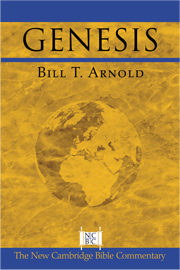Book contents
- Frontmatter
- Contents
- List of Supplementary Sections
- Preface
- A Word about Citations
- Abbreviations
- I INTRODUCTION
- II SUGGESTED READINGS ON GENESIS
- III COMMENTARY PART ONE: THE PRIMEVAL HISTORY – GENESIS 1–11
- IV COMMENTARY PART TWO: ANCESTRAL NARRATIVES – GENESIS 12–50
- Scripture Index
- Extrabiblical Texts Index
- Author Index
- Subject Index
- References
II - SUGGESTED READINGS ON GENESIS
Published online by Cambridge University Press: 05 June 2014
- Frontmatter
- Contents
- List of Supplementary Sections
- Preface
- A Word about Citations
- Abbreviations
- I INTRODUCTION
- II SUGGESTED READINGS ON GENESIS
- III COMMENTARY PART ONE: THE PRIMEVAL HISTORY – GENESIS 1–11
- IV COMMENTARY PART TWO: ANCESTRAL NARRATIVES – GENESIS 12–50
- Scripture Index
- Extrabiblical Texts Index
- Author Index
- Subject Index
- References
Summary
The following suggestions are neither exhaustive nor exhaustively annotated. The amount of secondary literature on the book of Genesis is enormous, so the list offered here is merely a guide to further reading and research, as is done in other volumes in this series. The intent is to serve as a point of entry for students of the book of Genesis, providing an up-to-date reading list for some of the most helpful literature available. For more complete bibliography, see the critical commentaries mentioned in the first section below.
COMMENTARIES
A magisterial work that has commanded the attention of all interpreters of Genesis since its publication is Claus Westermann's three-volume work published in English translation in 1984–86 (trans. John J. Scullion; Minneapolis: Augsburg Publishing House; German edition in 3 vols.; Neukirchen-Vluyn: Neukirchener Verlag des Erziehungsverein, 1974–82). Westermann's bibliographies are exhaustive to the date of his German edition, and even though he was writing just as the newer literary approaches were burgeoning, he at times interacts with those early efforts as well. Gordon J. Wenham's volumes are rich in literary and theological connections (2 vols.; WBC 1 and 2; Dallas, Tex.: Word Books, 1987 and 1994) and Victor P. Hamilton is most helpful for his frequent philological observations, and specifically Christian applications in the sections devoted to “New Testament Appropriation” (2 vols.; NICOT; Grand Rapids, Mich.: Eerdmans, 1990 and 1994).
- Type
- Chapter
- Information
- Genesis , pp. 20 - 26Publisher: Cambridge University PressPrint publication year: 2008
References
- 1
- Cited by

